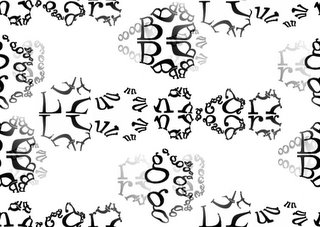Now I know it's not proper for me to claim a word has buzz status just because I discovered it in some high brow magazine and thought it'd sound good at parties. And I accept that my insistence that such words
ought to have special currency, despite what the rest of the world thinks, is a tad immature. But blame me for this indulgence: PREDISPOSED. My god, there was a time there where I couldn't walk straight without having faux-casually dropped this word at least a dozen times a day. Yes, and here comes the shopping trolley full of bricks, you might say I was addicted. Just like my father before me, who uses more superlative language than the entire Californian evangelical Christian community, I'm blind to evidence of danger until it smashes into my shins and makes me cry.
And addiction always equals danger. (Don't say "love". I really do mean
always.)
Paul Bloom is a professor of psychology and linguistics at Yale. (He's also a powerful spruiker for the movement (atheism) that, in a modern world floating around in clouds of ambiguity, dare not speak it's name. But that's an aside.) As well as reminding his readers about the Nun Bun (a pastry that bears an "eerie resemblance to Mother Teresa"), Bloom argues that there are sound evolutionary reasons for belief in the supernatural (more specifically, religion). He begins his discussion by considering the difficult question of the "origin of religious belief". Here are a couple of appetisers.
(1) We have "adopted religion as an opiate, to soothe the pain of existence". Serving the purposes of a god, for example, fills peoples' otherwise chaotic and insignificant lives with meaning. (Overdoses are common, however, so check the instructions. Witness Tom Cruise's paranoia about satirical representations of his "religion".)
(2) Religion is a fraternity which brings people together, "giving them an edge over those who lack this social glue". Fraternal communities satisfy peoples' existential needs by fostering -- often ritualistically -- shared values and ideals. (This partly explains foreskin snipping and the unholy application of table tennis bats to teenage bible scholars' dirty little sinful botty bots.)
But is this enough to explain why "gods, souls, an afterlife, miracles, divine creation of the universe and so on [are] brought in"? Bloom answers in the negative. In fact, all that quelling of disorder anxiety and happy clapping can be done without the involvement of religion at all (think Disneyland). And this leads to the scene of a calamitous accident.
Bloom informs us that a large body of scientific evidence, much of it recently gathered, proves we are mistaken when we perceive "the world of objects as essentially separate from the world of minds". For many, this is a big problem whose complexities can inspire a lifetime of philosophical cave exploration. But for many psychologists and neuroscientists such complexities are cast aside with the bold claim that
the mind is what the brain does.
So this is part of the accident. We have evolved to imagine phenomena that occupy a world beyond our natural circumstances. We do not equate our mental experiences with our physical ones because this is so absurdly counter-intuitive. In reality, however, we allow ourselves to be kidnapped by reality and forced to contemplate the interior of the boot of its car (while straining to hear a distant conversation about Jim Jones and the Peoples Temple). And it delights me to add that this comes as no surprise because, wait for it, we are biologically
predisposed to support such ethereal imaginings.
The other part of the accident is a consequence of the first. The "natural-born dualism" Bloom describes not only enables us to "envision soulless bodies and bodiless souls" but causes "our system of social understanding [to] overshoot", which in turn causes us to "infer goals and desires where none exist".
I'll finish now with this fearless oversimplification of Bloom's argument: god is a product of the inherent (and inherently false) natural conception we all have (at least to begin with) of the separation of mind and body. We want him because we need him and we've got him because we've evolved to be pretty good at concocting him.
god, it all sounds so hopeless.








